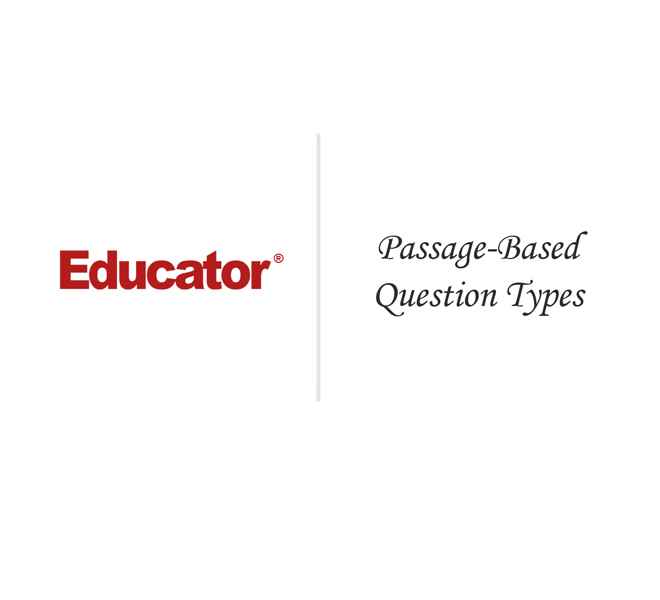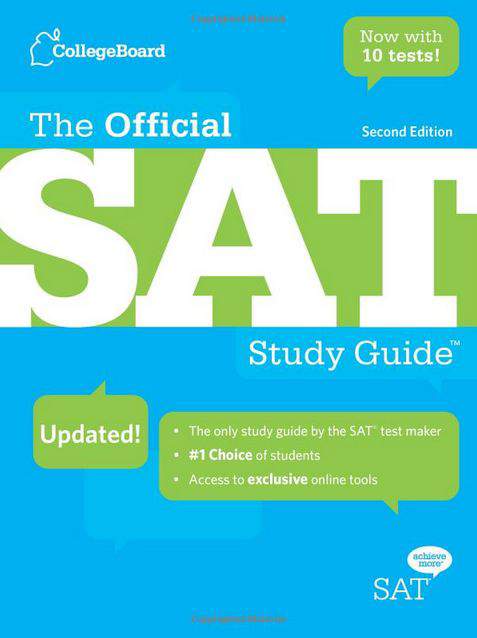

Rebekah Hendershot
Passage-Based Question Types
Slide Duration:Table of Contents
Section 1: Vocabulary
Essential SAT Vocab: Part 1
11m 33s
- Intro0:00
- Lesson Overview0:09
- Ways to Improve Your Vocabulary0:38
- Read!0:46
- Listen!1:46
- Talk!2:40
- Erroneous3:12
- Prudent4:03
- Frivolous4:49
- Indignation5:40
- Credulous6:27
- Longevity8:15
- Misconceive8:38
- Context9:15
- Forebode10:16
- Predilection10:51
Essential SAT Vocab: Part 2
8m 19s
- Intro0:00
- Lesson Overview0:11
- Ways to Improve Your Vocabulary0:31
- Read!0:35
- Listen!0:47
- Talk!1:06
- Benevolent1:16
- Exotic1:59
- Equanimity2:34
- Amass3:02
- Dilettante3:24
- Deference4:01
- Congenial4:28
- Bewilder5:22
- Benefactor5:47
- Demagogue6:55
Essential SAT Vocab: Part 3
7m 41s
- Intro0:00
- Lesson Overview0:11
- Ways to Improve Your Vocabulary0:30
- Read!0:34
- Listen!0:56
- Talk!1:16
- Precursor1:28
- Consensus2:03
- Sufficient2:42
- Allege3:08
- Afflict3:47
- Disposition4:20
- Adverse4:39
- Charisma5:23
- Volatile5:56
- Oblivious6:51
Essential SAT Vocab: Part 4
7m 10s
- Intro0:00
- Lesson Overview0:14
- Ways to Improve Your Vocabulary0:35
- Read!0:39
- Listen!1:03
- Talk!1:22
- Urgent1:36
- Unprecedented2:19
- Arbitrary2:56
- Constituent3:24
- Tact3:57
- Insolent4:33
- Tyrannical5:04
- Temperament5:30
- Stringent6:01
- Repute6:24
Essential SAT Vocab: Part 5
6m 50s
- Intro0:00
- Lesson Overview0:10
- Ways to Improve Your Vocabulary0:29
- Read!0:34
- Listen!0:47
- Talk!1:05
- Belligerent1:15
- Prolong2:06
- Diverse2:34
- Devoid3:05
- Spare3:31
- Anecdote4:10
- Ornate4:50
- Vivid5:14
- Magnanimous5:56
- Commonplace6:17
Essential SAT Vocab: Part 6
7m 58s
- Intro0:00
- Lesson Overview0:13
- Ways to Improve Your Vocabulary0:37
- Read!0:42
- Listen!0:50
- Talk!1:03
- Ascertain1:16
- Commend1:46
- Dispense2:14
- Capricious2:59
- Atypical3:28
- Articulate4:00
- Arouse5:05
- Apathetic5:35
- Enigma6:28
- Reverence7:00
Essential SAT Vocab: Part 7
7m 20s
- Intro0:00
- Lesson Overview0:14
- Ways to Improve Your Vocabulary0:39
- Read!0:44
- Listen!0:51
- Talk!0:59
- Anomaly1:16
- Alleviate2:00
- Admonish2:35
- Steadfast3:13
- Deliberate3:58
- Sustain4:19
- Somber4:54
- Refute5:26
- Penchant6:24
- Reticence6:47
Essential SAT Vocab: Part 8
9m 9s
- Intro0:00
- Lesson Overview0:13
- Ways to Improve Your Vocabulary0:38
- Read!0:46
- Listen!1:06
- Talk!1:21
- Paradox1:34
- Vigor2:29
- Obscure2:49
- Proximity3:25
- Mitigate3:58
- Egotism4:34
- Legitimate5:06
- Contemporary5:56
- Lament6:49
- Duplicitous8:09
Essential SAT Vocab: Part 9
12m 6s
- Intro0:00
- Lesson Overview0:15
- Ways to Improve Your Vocabulary0:41
- Read!0:47
- Listen!1:27
- Talk!1:45
- Linguistics2:06
- Commemorate3:17
- Candid4:02
- Callous5:30
- Brevity6:24
- Benign7:16
- Connoisseur8:18
- Anachronism9:01
- Prestige10:41
- Vindictive11:20
Essential SAT Vocab: Part 10
9m 30s
- Intro0:00
- Lesson Overview0:15
- Ways to Improve Your Vocabulary0:43
- Read!0:49
- Listen!1:37
- Talk!1:55
- Naïve2:08
- Exemplify3:03
- Erratic3:44
- Forbear4:16
- Discern5:25
- Autonomy5:54
- Eradicate6:37
- Abstruse7:05
- Rhetoric7:54
- Substantiate8:45
Section 2: Critical Reading
Sentence Completion Question Types
12m 29s
- Intro0:00
- Lesson Overview0:11
- What Are Sentence Completion Questions?0:40
- Choose the Correct Word to Fill in a Blank0:43
- Tests Your Vocabulary and Your Ability to Reason0:53
- Sentence Completion Question Types1:15
- Vocabulary-In-Context1:24
- Logic-Based Questions1:38
- Vocabulary In Context2:09
- Example2:16
- Logic-Based Questions2:54
- Example3:11
- Sentence Completion Strategies3:28
- Pick a Word, Any Word3:33
- Example4:02
- Positives and Negatives4:36
- Example5:03
- Process of Elimination5:24
- Example6:07
- Sentence Completion Tips7:41
- Look for Clue Words7:48
- Look for the Relationship Between the Two Words and the Sequence of the Blanks8:44
- Never Eliminate a Choice Unless You Are Sure of Its Meaning10:38
- If You Can Only Eliminate One Answer Choice, Move On and Come Back To It Later11:42
- If You Can Eliminate Two Choices, Feel Free to Guess11:54
Passage-Based Question Types
17m 46s
- Intro0:00
- Lesson Overview0:10
- What Are Passage Based Questions?0:55
- Questions Related to Long, Short, or Paired Passages0:58
- May Ask You for Info Directly Related in the Passage or to Draw Conclusions or Make Predictions1:12
- Passage Types1:32
- Question Types2:35
- Literal Comprehension2:38
- Vocabulary-In-Context2:50
- Extended Reasoning3:09
- Literal Comprehension3:24
- Rely On Your Memory or Look Back at Passage3:28
- Watch Out for 'Reversal Words'3:51
- Example3:57
- Vocabulary In Context4:52
- Most of These Words Have Multiple meanings5:00
- Reread the Sentences to Which the Questions Refer5:06
- Example5:20
- Extended Reasoning6:07
- May Ask You to Determine the Main Idea or Author's Primary Purpose6:11
- Draw Conclusions Based on the Info Provided6:43
- Identify the Author's Tone or Attitude7:18
- Passage-Based Strategies7:38
- Take Notes7:44
- Read What's There… and What Isn't8:34
- Ask Questions9:39
- Read the Questions First10:39
- Key Words and Phrases11:24
- When You See: According to the Author11:30
- When You See: Best11:42
- When You See: Chiefly12:09
- When You See: Except12:31
- When You See: The Author Implies12:54
- When You See: Least13:21
- When You See: Mainly13:33
- When You See: Most13:38
- When You See: Only13:47
- When You See: Primarily14:03
- Passage-Based Tips14:08
- All the Answers Will Be In or Implied By the Passage14:12
- Watch Out for Descriptive Words and Phrases14:29
- Make Sure the Passage Supports Whichever Answer You Choose15:40
- Use Process of Elimination15:45
- If You Must Jump Around, Do So Within a Set of Questions16:40
What to Read For the SAT
37m 42s
- Intro0:00
- Lesson Overview0:08
- Why Read?0:57
- Best Way to Build You Vocabulary1:01
- Practice Understanding What the Authors Are Saying 'Between the Lines'1:12
- How to Choose Books2:42
- Choose Books in Areas That Interest You2:55
- Choose Books That Challenge You3:10
- The Rule of Three4:27
- If a Work Is Short, Give It Three Pages to Pique Your Interest4:57
- If a Work Is Long, Give it Three Chapters to Pique Your Interest5:09
- Great Books for Every Interest5:32
- Ask Yourself What Are Your Favorite Things to Watch & Do?5:51
- Asking a Librarian for Great Books6:24
- Mystery6:49
- Adventure10:14
- Fantasy12:55
- Science Fiction17:13
- Humor21:10
- Romance23:09
- Realistic Fiction24:12
- A Great Place to Start25:12
- Nation - Terry Pratchett25:21
- If You Can't / Won't Read27:19
- Listen to Audio books27:31
- Watch Live Performances27:53
- Shakespeare Performed BY People Who Love Shakespeare28:48
- The Dirty Secret of Reading29:31
- Comic Books!29:38
- The Unwritten - Mike Carey33:59
Section 3: Sample Tests
Answer Guide: Section 3 (Critical Reading)
16m 11s
- Intro0:00
- Lesson Overview0:13
- Sentence Completions1:04
- Question 11:06
- Question 21:55
- Question 32:17
- Question 43:05
- Question 53:40
- Passage-Based Questions4:12
- Question 64:13
- Question 75:03
- Question 85:54
- Question 96:26
- Question 106:49
- Question 117:26
- Question 127:47
- Question 138:34
- Question 149:05
- Question 159:43
- Question 1610:26
- Question 1711:17
- Question 1812:08
- Question 1912:36
- Question 2013:21
- Question 2113:54
- Question 2214:21
- Question 2314:43
- Question 2415:16
Answer Guide: Section 7 (Critical Reading)
14m 43s
- Intro0:00
- Lesson Overview0:10
- Sentence Completions0:54
- Question 10:55
- Question 21:45
- Question 32:01
- Question 42:33
- Question 53:11
- Passage-Based Questions3:37
- Question 63:38
- Question 73:55
- Question 84:27
- Question 94:58
- Question 105:33
- Question 116:09
- Question 126:30
- Question 136:59
- Question 147:38
- Question 158:25
- Question 168:52
- Question 179:31
- Question 189:59
- Question 1910:30
- Question 2011:01
- Question 2111:46
- Question 2212:21
- Question 2313:09
- Question 2413:47
Answer Guide: Section 9 (Critical Reading)
10m 45s
- Intro0:00
- Lesson Overview0:11
- Sentence Completions0:57
- Question 10:58
- Question 21:35
- Question 32:07
- Question 42:56
- Question 53:08
- Question 63:31
- Passage-Based Questions3:46
- Question 73:47
- Question 84:34
- Question 95:07
- Question 105:33
- Question 115:50
- Question 126:23
- Question 136:50
- Question 147:11
- Question 157:42
- Question 168:28
- Question 178:54
- Question 189:17
- Question 199:50
Loading...
This is a quick preview of the lesson. For full access, please Log In or Sign up.
For more information, please see full course syllabus of SAT Critical Reading
For more information, please see full course syllabus of SAT Critical Reading
SAT Critical Reading Passage-Based Question Types
Lecture Description
In this lesson, our instructor Rebekah Hendershot goes through an introduction on passage-based question types. She discusses passage types, question types, literal comprehension, vocabulary in context, extended reasoning, passage-based strategies, key words and phrases and tips.
Bookmark & Share
Embed
Share this knowledge with your friends!
Copy & Paste this embed code into your website’s HTML
Please ensure that your website editor is in text mode when you paste the code.(In Wordpress, the mode button is on the top right corner.)
×
Since this lesson is not free, only the preview will appear on your website.
- - Allow users to view the embedded video in full-size.
Next Lecture
Previous Lecture














































0 answers
Post by Kishor Pant on December 22, 2014
Thank you so much! Your series has been quite helpful. These tips are so refreshing! :)
1 answer
Sun Aug 4, 2013 6:52 PM
Post by Lavanya Kanneganti on August 4, 2013
By the time I'm in junior year will my teachers have taught me most of the concepts i need to score better on the SAT??
On the ACT do you have any recommendations for resources that will help you improve in the science section of it?
1 answer
Sun Aug 4, 2013 4:16 PM
Post by Lavanya Kanneganti on August 4, 2013
Yes, I understand and totally agree. Thank you! I don't know what high school you went to but most of the people that i know are asian so the dying your hair blonde, being anorexic, and joining the basketball team are some what far-fetched. :)
I'm going to be a freshmen this year so i was wondering what would be a good SAT score as a freshmen to have, to know if you're headed in the right direction.
1 answer
Sun Aug 4, 2013 12:34 AM
Post by Lavanya Kanneganti on August 3, 2013
Here in Kentucky most of the high schoolers that i know say to skim,because we won't have enough time to finish reading the passage and to be able to thoroughly understand it. So I've been practicing speed reading and skimming,(because i never really understood what to do when you "skim"). Do you have any recommendations for ways to improve your speed reading other than reading (i got that one covered)?
1 answer
Sat Aug 3, 2013 1:23 AM
Post by Lavanya Kanneganti on August 2, 2013
Do you recommend that we skim the passage because of time or that we read the passage? And would it be a good idea to learn speed reading and comprehending too?